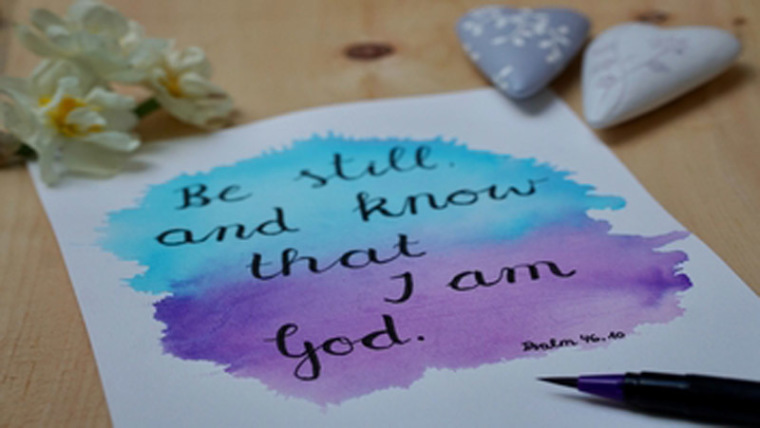
If God is who He says He is, then what?
This question has been cycling through my mind the last few weeks. Who is God and what does His identity mean for my situation? What does it mean for my anxiety? Confidence? Security? Loneliness? Ability to succeed? Relationships? Future?
Who is God?
The Bible may not be entirely clear about everything, but it does outline the character of God for us. God is:
Triune – “May the grace of the Lord Jesus Christ, and the love of God, and the fellowship of the Holy Spirit be with you all.” (2 Corinthians chapter 13, verse 14)
Love -“Anyone who does not love does not know God, because God is love.” (1 John chapter 4, verse 8)
Consistent- “Jesus Christ is the same yesterday, today, and forever.” (Hebrews chapter 13, verse 8)
Holy-“And one called to another and said: ‘Holy, holy, holy is the Lord of hosts; the whole earth is full of his glory!’” (Isaiah chapter 6, verse 3)
Way, Truth, Life -“Jesus said to him, ‘I am the way, and the truth, and the life. No one comes to the Father except through me.’” (John chapter 14, verse 6)
Creator - “In the beginning God created the heavens and the earth.” (Genesis chapter 1, verse 1)
Faithful - “Know therefore that the Lord your God is God; he is the faithful God, keeping his covenant of love to a thousand generations of those who love him and keep his commandments.” (Deuteronomy chapter 7, verse 9)
Light -“This is the message we have heard from him and proclaim to you, that God is light, and in him is no darkness at all.” (1 John chapter 1, verse 5)
Strength - “The LORD is my light and my salvation; whom shall I fear? The LORD is the strength of my life; of whom shall I be afraid?” (Psalm chapter 27, verse 1)
So…
I went to a Christian school for 13 years, currently work at a Christian school, and am married to a pastor. I can list off many more characteristics of God and have my fair share of scriptures memorised. My Christian resume is quite extensive.
Yet, today I found myself overwhelmed with anxiety and completely bought into many lies of the enemy. My mind spun for hours until the Holy Spirit questioned me again, “If God is who He says He is, then what?”
The characteristic of the Lord that struck me was His sovereignty. Job says of the Lord:
“I know that you can do all things, and that no purpose of yours can be thwarted.” (Job chapter 42, verse 2)
If God is sovereign over all things, then He is sovereign over my life and circumstances. If God is sovereign over my life and circumstances, then why do I consistently chooseto dwell on things outside of my control and the lies of the enemy?
I work in a role similar to that of a school counselor and consistently remind my students that the state of our feelings is our choice. That, and Paul encourages us to take every thought captive (2 Corinthians chapter 10, verse 5).
Therefore, if my thoughts and emotions are within my control, dwelling on anxiety and things that I knoware lies from the enemy is my choice! I am not a victim of my circumstance.
If I am choosing to dwell on lies and theuncontrollable, then what does that say about what I believe about the sovereignty of God?
In my most honest, cynical heart, I would admit that it means that I do not believe that God is who He says He is.I am believing that He is simply human, that He can and will let me down, and cannot turn my circumstances around.
Why not believe?
Again, in raw honesty, I believe that we do not believe that God is who He says He is because it is scary. If God is who He says He is, we cannot help but surrender total control of our lives, because trying to wrestle sovereignty from the Lord is futile. There is equal parts of comfort and terror in being still and knowing that He is God.
Choosing to dwell in the knowledge of who and what God is removes fear, but it also removes control – and we crave control. The second that we as children learn the word ‘no’, it becomes our all time favourite word because it gives us some control (or at least imagined control) over our lives.
A sense of control means that we can change our circumstances if they are not favourable or to our exact liking.
Even in choosing to dwell on anxious thoughts and lies (note: I am not talking about diagnosed anxiety disorder, I am talking about our non-clinical stinking thinking), we maintain a sense of control. Our anxiety stems from the belief that our control has been taken from us – as though we ever had sovereign control.
What happens if we let God be God?
There comes a time in our anxious state that we have to give in. Our bodies and minds were not designed to constantly maintain a state of anxiety – it is simply too exhausting. After either a serious cry, a holy slap in the face, or a come-to-Jesus moment, we have to cast all our cares on the Lord. If only there were some sort of Holy text that instructed us to do that in the first place…
The Bible, in addition to being clear on who God is, is very clear on what our lives should look like if we let God be God.
“But the fruit of the Spirit is love, joy, peace, patience, kindness, goodness, faithfulness.” (Galatians chapter 5, verse 22)
Yikes. Tough list for someone who just admitted to being very anxious today.
If God is God, then despite our circumstances, we can experience a peace that surpasses all understanding. The kind of peace that protects us as we dwell in the reality of who God is.
“And the peace that surpasses all understanding will guard your hearts and minds in Christ Jesus.” (Philippians chapter 4, verse 6)
If we truly acknowledge who God is in our thoughts, relationships, vocation, finances, success, and future plans, we should be experiencing this peace regularly! So, I challenge you with the question that the Holy Spirit has been challenging me with, whatever your circumstances are: If God is who He says He is, then what?

Petro Lancaster is a school counselor in-training and a newlywed wife to her husband, Ansen, who is a worship pastor at their church in Ohio. Originating from South Africa and growing up in New Zealand has given Petro a love for all things sport and travel, and a heart for the importance of community. Writing is Petro’s way of making sense of the world around her and expressing the words God places on her heart.